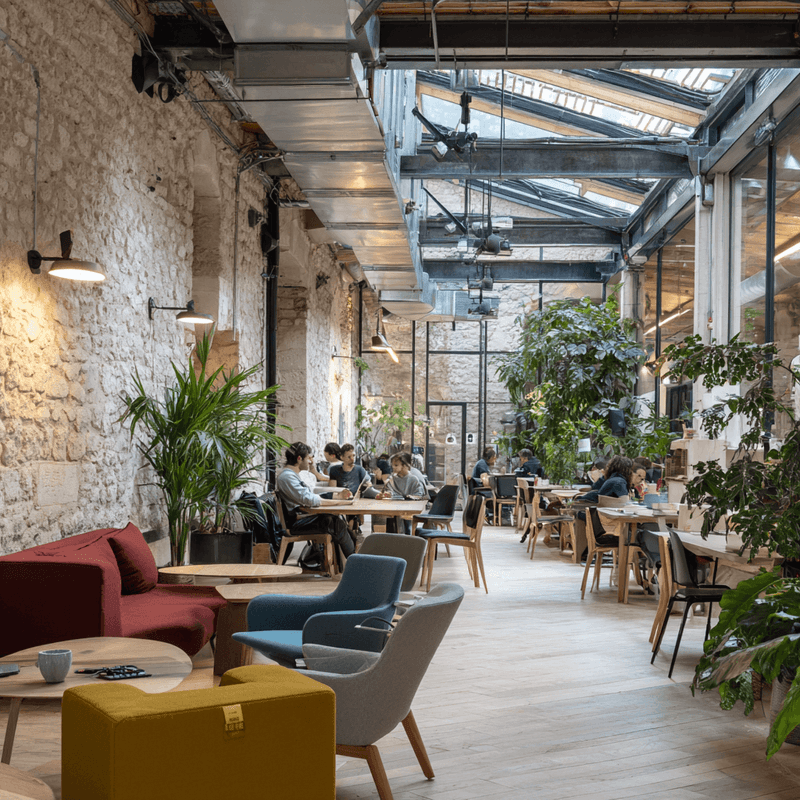
Coworking spaces have seen their number and model explode in recent years. They challenge the traditional office model by offering flexibility and time savings. However, the question of environmental impact is emerging for companies, highlighting the need for a more eco-responsible working environment. Today, companies are called upon to play a major role in reducing carbon emissions and combating climate change. Numerous standards and laws are in place, requiring companies to implement transparency reports. Coworking spaces, which are now an integral part of corporate policies, should also be taken into account in the balance. Between flexible use of resources, reduced energy costs and the creation of eco-conscious communities... What if coworking spaces could accelerate this transition?
What obligations do companies have to reduce their carbon emissions?
Ambitions are high, with the European Climate Law aiming for carbon neutrality by 2050 and an initial reduction in greenhouse gases of around 60% by 2030.
Any company can carry out a carbon footprint if it wishes, but not all companies are obliged to do so. The carbon footprint is to be distinguished from the regulatory GHG footprint, which is mandatory for companies with over 500 employees, those with over 250 employees located in French overseas departments, and local authorities with over 50,000 inhabitants. However, the Convention Citoyenne pour le Climat (CCC) ( Citizens' Climate Convention ) has examined the issue and put forward proposals to extend the obligation to VSEs and SMEs.
The GHG balance sheet covers three distinct perimeters, taking into account the company's own activities as well as those upstream and downstream of the company.s upstream and downstream activities, including products bought and sold, and other indirect emissions (raw materials, waste, transport, etc.). In France, to be validated, the BEGES must be published on the website ofADEME, the French agency for ecological transition.
Beyond their obligations, companies also see it as a way of developing their competitive edge, enhancing their brand image and making substantial savings.
Are coworking spaces really greener?
Coworking has expanded significantly in recent years, becoming a competitive alternative to traditional offices. This transition, stimulated by changing working patterns in the wake of the COVID-19 pandemic, has prompted companies to re-evaluate their workspaces. Coworking, by offering flexibility and time savings, has seduced many companies, but this trend raises questions about its environmental impact.
Coworking: a truly eco-responsible option
Coworking is presented as an eco-responsible option, making a positive contribution to the environment. Coworking spaces, sometimes referred to as "green coworking", promote flexibility by optimizing the use of real estate resources.
Some eco-responsible coworking spaces go even further, using eco-friendly building materials, energy-efficient heating and cooling systems, and even installing solar panels to generate renewable energy.
Unlike traditional offices, which are often unoccupied, coworking spaces maximize their use, reducing wasted space and limiting the need for new buildings, which would have a greater ecological impact. At the initiative of theAccelerator, the Morning coworking brand had launched an initial call for projects in October 2023 to help ensure the ecological transition of the building sector. 10 projects were selected and their project leaders were given 6 to 9 months' support to help them implement their solutions on a larger scale. Among them are Malàkio and their shell waste furniture creations, Terrio, which promotes low-carbon raw earth blocks for construction, and PowerofMoss, which is rethinking interior insulation and vegetation with natural foam. Season 2 has just begun, with the key issues being energy renovation, local energy production and water and waste recovery.
Coworking promotes the use of all resources
With its focus on sharing resources, coworking also limits over-consumption by sharing equipment such as printers and encouraging the reuse of furniture. Some coworking spaces are now making these issues a key priority. One example isHiptown, which has signed a partnership agreement with Bluedigo: "Hiptown does everything it can to make its sites virtuous: selective sorting with incentives, donations to associations, promotional sales of products to avoid waste, and reuse of second-hand furniture. This saves the extraction of 2.7kg of raw materials per square metre and the production of 11.8kg of CO2 per square metre for each of its 21 sites. " says one of the directors.
Imagin'Office has teamed up with the For Me Lab brand to furnish its coworking spaces, offering environmentally-friendly and eco-responsible handcrafted creations.
Coworking calls for responsible travel
Generally located in areas well served by public transport, coworking spaces help reduce the need to travel by car, thus contributing to the reduction of greenhouse gas emissions. What's more, these spaces incorporate energy-saving technologies and resource-efficient solutions, reducing their overall energy consumption.
A pioneering study carried out by IWG in May 2023 in the USA and UK reveals that working closer to home can significantly reduce carbon emissions, by up to 70% in Manchester and 87% in Los Angeles. The study doesn't give us the impact this could have in France, but we do know that transport is a major source of CO2 emissions, with 60.7 Mt CO2 emitted in 2020 by household vehicles, accounting for 53.5% of transport emissions alone. Reducing commuting distances is therefore a real challenge. Christophe Burckart, CEO of Regus France, adds : "In the face of urban overcrowding, coworking is emerging as an interestingsolution , both in terms of reducing our CO² emissions and the economic renewal it enables in outlying areas".
Coworking creates positive dynamics
By promoting sustainability awareness within their communities, coworking spaces create a dynamic where members share ideas and experiences on how to be more environmentally friendly. This approach, combined with the flexibility offered by coworking, reduces the over-consumption of space, energy and resources, helping to build a more responsible working future.
As part of the SSE (Social and Solidarity Economy) month, theLa Chapelle 2.0 coworking space organized a whole series of workshops in partnership with the "Nos vies Bas Carbone" association to help us understand the mechanisms and modify our behavior. At Bureaux and co, the winning formula is the Hackathons, where ideation, prototyping and pitches are the order of the day.
The sector is evolving, and more and more initiatives are being launched every month. However, it is crucial to continue promoting eco-responsible practices within these spaces, and to encourage companies to integrate these values into their operations.
Coworking spaces are therefore emerging as potential allies in the transition to a greener economy. In response to the need to reduce greenhouse gas emissions, these spaces offer an eco-responsible alternative to traditional offices. By encouraging flexibility, pooling resources and promoting eco-friendly practices, coworking is emerging as a working model aligned with contemporary environmental issues.
-
How can the flexible office reconcile real-estate costs and employee expectations?

05/01/2026 How can the flexible office reconcile real-estate costs and employee expectations?
For decades, the office has been seen as an immutable anchor: an assigned position, a fixed desk, a space designed to accommodate every employee from Monday to Friday, between 9am and 6pm. But this model, long considered indisputable, is now faltering under the impact of profound transformations in the world of work. Massive telecommuting, renewed employee expectations, the search for balance and meaning, and economic pressure on real estate are all forcing organizations to rethink their approach.
-
From cost reduction to cultural transformation: the real challenges of the flexible office

15/12/2025 From cost reduction to cultural transformation: the real challenges of the flexible office
Giving up personal office allocation was no longer seen as an upheaval, but rather as an obvious way of reducing costs, improving real estate efficiency and adapting spaces to contemporary uses. However, the companies that have taken the plunge recognize that the reality far exceeds this initial justification. A genuine cultural transformation was underway!
-
Does coworking restore the value of work?

08/12/2025 Does coworking restore the value of work?
Today, many organizations see Coworking as more than just a real estate service; they see it as a space capable of restoring value to work itself and re-engaging teams. But what exactly is this "value" that coworking claims to restore?